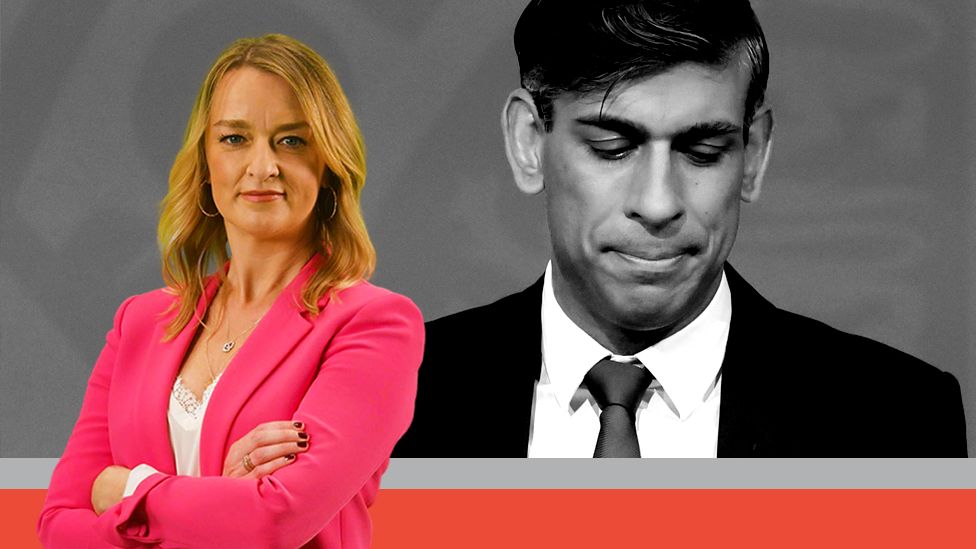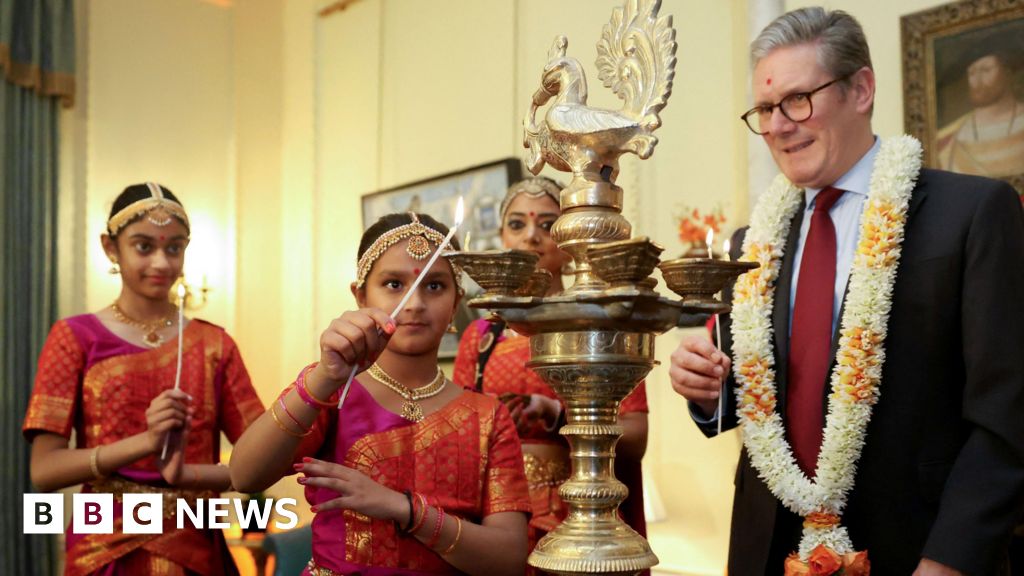ARTICLE AD BOX
 Image source, EPA
Image source, EPA
I know it's nearly Christmas, and maybe the last thing you want to think about is politics. But you might have to.
The governing party has to.
Because the Downing Street operation is in real trouble.
And, while it seemed a bit wild when we talked about it last week, it is not crazy to think that the Conservatives really are in such a bad place that some of them are wondering if a change of leader might be needed.
Take a breath - it is not the consensus that rolling a dice to produce a sixth prime minister since the EU referendum would be a good idea. But it is no longer a completely fringe view, for several really important reasons.
Rishi Sunak is under genuine pressure. He has to front up to the Covid inquiry on Monday, and on Tuesday there is the first vote on a plan he put his name to that has gone badly wrong.
Problem one: the Tories just can't agree on how to keep one of the PM's big promises, to 'stop the boats'.
That phrase has become part of the political lexicon, but Rishi Sunak's slogan has become a millstone around his administration's neck.
The plan was based on an aspiration to put off migrants from around the world from coming to the UK by saying they would be sent to an African country instead if they made it here. The problem overcame early political controversies, and Parliament approved it some time ago.
But then it hit practical and legal challenges. In the last few days, Mr Sunak's new attempts to make his long-term wish come true have been battered by some of his own party.
He's stopped short of the more radical action some of his MPs believe is needed to get planes in the air without further time-consuming legal tangles, but his new laws have gone further than other colleagues are comfortable with.
Like Theresa May's Brexit compromises, it doesn't quite satisfy everyone on the right of his party, and but it makes people at the softer end of his tribe feel itchy.
The result? He's stuck in the uncomfortable middle on an issue that he chose to make his own.
This weekend MPs of all stripes in his party are mulling over whether to back the plan or not. (Although be cautious about the headlines predicting certain disaster, as many backbenchers are likely to let the proposals pass at its first stage debate, known as second reading, but then try to tweak them, pull them apart, or even kick them out after Christmas.)
Problem two: it's not just the opponents you could predict who are in a stew. The prime minister's friend, and the minister who was in charge of dealing with the problem, has walked away. Robert Jenrick, who'll be with us in the studio on Sunday, says the plan simply won't work and he is raising big doubts about the government's whole approach to managing migration from abroad.
Problem three: Number 10 is not just trying to tack between two sides, but a restive brew of different tribes who all follow different lines.
It is impossible to imagine pleasing them all, and hard to see a situation where they all are content to go along with Number 10. One MP poking fun at the different groups describes them as follows: "The 'One Nation' would be the school swats. The goody two shoes. The European Research Group (ERG) are the Colonel Blimps or those old blokes who sit in the corner of the pub and the New Conservatives are those really annoying out of control kids in parks. The Truss lots are the Dementors!"
Catty jokes aside, how could one leader ever keep them all in check, even on issues that were not controversial? Of course, political parties are always coalitions. It's ridiculous to imagine they are all always in total harmony. But one former minister suggested in the Tory party in 2023: "There is no cohesion as a parliamentary team on any level - they don't like one another, and they don't get on."
- On this week's show is Robert Jenrick, who resigned as immigration minister this week
- We'll also hear from Levelling Up Secretary Michael Gove and shadow work and pensions secretary Liz Kendall
- And Laura has interviewed Ukraine's First Lady Olena Zelenska in Kyiv
- Watch live from 09:00 GMT on BBC One and BBC iPlayer or watch and follow updates here on the BBC News website
- Email the show anytime: kuenssberg@bbc.co.uk
Problem four: an unhappy, messy Conservative Party faces a different opposition.
It was one thing for the Tories to be permanently scrapping when Theresa May was in charge, or when Boris Johnson took over. The green benches opposite them then were full of unhappy factions under Jeremy Corbyn.
Labour is different now, and the Tories know it.
Leaked recordings reach my ears of the trade minister and former Conservative chair, Greg Hands, telling student activists in Oxford at the end of October as much.
He said that voters have been put off by the turmoil in Number 10. "They have been turned off by us, particularly by the events of last year where we had three prime ministers."
And he said that although Keir Starmer might not have created rapturous excitement among the voters, the idea that Labour is a threat for voters, has gone.
In the recordings he says: "Corbyn was a great deterrent for a lot of more liberal-minded Conservatives from voting anything other than Conservative because they were afraid they would get Corbyn as their prime minister."
When talking about trying to hold on to voters he's heard to say that Starmer "isn't Corbyn, he doesn't alienate, frighten people like Corbyn does so that I think is a taller task for us at the moment is keeping those people on side". Mr Hands did say there were Conservative voters who could yet return to the party.
Watch: My patience with Rwanda plan has worn thin - Sunak
In response to that recording, he says: "As I said in Oxford, Sir Keir Starmer hasn't convinced the British people - and the Conservative Party can still win the next general election.
"Like Neil Kinnock in the 1980s, Sir Keir Starmer is not as left wing as his predecessor, but he is still too left wing for the British people, and when the spotlight is on him, he will be found out. He changes his mind on every single major issue to please his audience, whether it be the monarchy, the EU, tuition fees or taxation."
Rishi Sunak's allies would say, with some justification, that the prime minister created calm after a spasm of chaos.
But looking at recent events, it's clear that wasn't powerful enough to prevail. And his many resets have perhaps gone into reverse. The splits now seem as sore as ever.
Maybe that's because after so long being behind in the polls some Tory MPs would rather choose their own principles over the party's success.
Maybe it's because Rishi Sunak hasn't been able to persuade them that unity is a prize worth fighting for.
Maybe it's because after so long in power with endless reinventions the party isn't sure what it's really for.
Maybe it's a mix of all of the above, and more.
In fact, Rishi Sunak still leads a party that enjoys a massive majority in the House of Commons. The next election does not have to happen for another 12 months. Voters are volatile creatures these days, the public mood can move very fast.
But the prime minister's USP - ending the chaos of the Truss and Johnson year - has taken a battering. Splits and scrapping are back. And the public does not like divided parties.
Right now, that might be one of the few political truths that Conservative MPs can agree on.
What questions would you like to ask Laura's guests on Sunday?
In some cases your question will be published, displaying your name, age and location as you provide it, unless you state otherwise. Your contact details will never be published. Please ensure you have read our terms & conditions and privacy policy.
Use this form to ask your question:
If you are reading this page and can't see the form you will need to visit the mobile version of the BBC website to submit your question or send them via email to YourQuestions@bbc.co.uk. Please include your name, age and location with any question you send in.

 11 months ago
18
11 months ago
18








 English (US)
English (US)